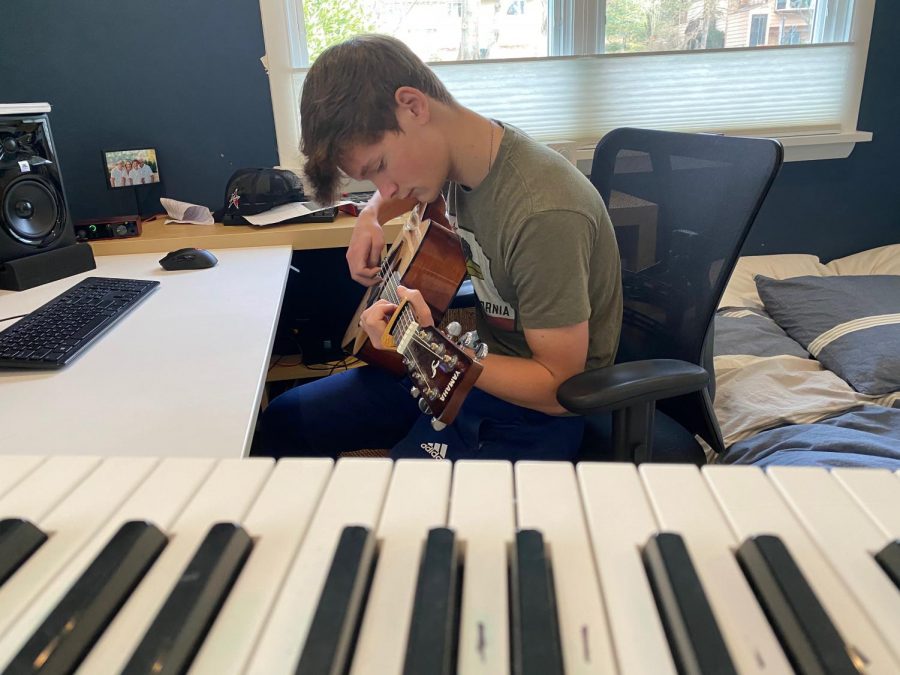Pandemic producers: ‘Making beats’ gains popularity among students
Photo courtesy of Ian Sincevich
Junior Ian Sincevich strums his guitar while creating a beat in his house. Guitars and keyboards are two common instruments incorporated into modern beats.
May 3, 2021
Instead of staying out late with friends or working on homework like a typical high school student, junior Henry Cheetham sits in his room, glued to his computer. He spends all night making phone calls to artists, managers and record labels, sending emails, checking his social media and making original beats.
Cheetham, who uses the “stage name” Aston, has been producing music since 2017, but only started producing hip hop beats last March after the first stay-at-home orders of the coronavirus pandemic took effect. As the pandemic has raged on, Cheetham’s platform and status as one of the several original music producers from Whitman has only grown.
Cheetham makes a profit by selling his beats. For each production, he earns anywhere from $30 to $400, and puts his profits into the stock market. But Cheetham isn’t satisfied with his success, and is looking to land more lucrative placements — selling the rights to a beat to a more notable party — in 2021.
“That’s why I’m really excited for this year,” Cheetham said. “I’m 100% positive I’m going to get one with a big artist and get a big advance from it.”
Cheetham improves his skills in the studio by working with other Whitman producers — and there are quite a few of them.
Like Cheetham, junior Ian Sincevich — known to his listeners as Torino — also began producing beats at the onset of the pandemic. Cheetham was one of Sincevich’s inspirations to dive into music production, which has since blossomed into more than a hobby, he said.
“The whole creative process of making music is so cool to me,” Sincevich said. “To be able to make my own and work with artists around the country — and even the globe — is amazing. Those same people have the same vision I do.”
Sincevich and Cheetham often work with one another, conducting weekly beat reviews and critiquing each other’s music. Though there is always a healthy level of competition between teenagers in the beat-producing community, the two’s professional relationship is emblematic of how creators collaborate to improve on their skills, Sincevich said.
“We are at similar levels with producing, so we do our best to help each other out in any way possible,” he said. “I’m more of a melody maker while he’s more of a drum maker. So he helps me a ton with improving my drums and I help him with melodies.”
Making beats is a time-consuming process, taking between 16 and 20 hours a week, depending on if the beat is made from scratch or not. To Sincevich, his craft is certainly worth the intense time commitment — by putting in the hard work now, he will be able to land higher valued placements down the line, should it become his career, he said.
Sincevich has had the unique opportunity to work with production staff from Internet Money, a prominent record label responsible for popular song “Lemonade” featuring Don Toliver, NAV and Gunna.
Sincevich’s primary goal this year is to develop a better understanding of music theory to help him find inspiration and make melodies. He also intends on improving his piano and guitar skills to gain greater insight into versed music.
Music production remains popular among teenagers because of how personally-tailored the process is to the creator. It can be a way to simply unwind and have some fun for those who treat beat making as a hobby, and a time-consuming, hours-on-end commitment for artists who see it as a potential career path. Nora School junior Anderson White, also known as Suburban Mike, has been into music ever since he started playing the piano in the first grade. In fourth grade, he also started playing the drums. Eying the potential as a trained musician, Cheetham, a friend of White’s, introduced him to the process of making beats during middle school.
“I like making beats because it’s a way to express emotion without talking,” White said. “It’s the language of no words.”
White, however, does not share the same positive feelings about the music community that Cheetham and Sincevich have expressed. Compared to his friends, White maintains a relatively smaller platform, which can make it difficult to collaborate on projects with other artists, he said. Most student producers aren’t in the habit of working with undiscovered artists — who are viewed as less likely to raise profits — because the beat production business is, after all, a business.
White doesn’t see making money off of his work as a priority, though. His goals are to master Logic Pro, an advanced production program, as well as to improve his mixing skills and simply better understand the process, he said.
“A lot of people these days rap or produce to get popularity and make money because it has become so accessible to everyone,” White said. “This has been good for the growth of hip hop; however, it’s unintentionally built this culture that ignores the work, emotion and time others put into their craft.”
Junior Kai Banda is known for both his beat-making and piano skills. Banda started playing classical piano at eight years old, but didn’t begin producing beats until February 2020.
After plenty of convincing, Banda’s father got him a MacBook Pro with Logic Pro X allowing him to more effectively create high quality music.
“A lot of time and work has been put into making [my music] sound as good as possible,” Banda said. “Over the past few months, I have learned a lot in terms of mixing and composition”
Banda’s short-term goal is to get a professional sounding mix and master his songs, which will give his music the same sound quality and loudness to that of professionals. While Banda hasn’t sold any of his music yet, he plans to study sound engineering in college as a way to hone his craft.
“I love the process and the result of making something sound as nice and clean as possible,” Banda said. “I can apply this same principle to more complicated compositions to create really cool-sounding and impactful music.”
Most onlookers tend to stereotype high school-age producers as merely rap fanatics with unattainable dreams using cheap equipment to make sub-par beats. The surge of beat makers in the Whitman community, however, is emblematic of a larger trend: this next generation of creators is beginning to lead the industry.
“The music business is shifting to be controlled by a much younger generation than any other industry in the world,” Cheetham said. “It’s no longer these kids making beats in GarageBand; teenage producers are now producing Billboard-charting albums and creating the songs you hear on the radio every single day.”










